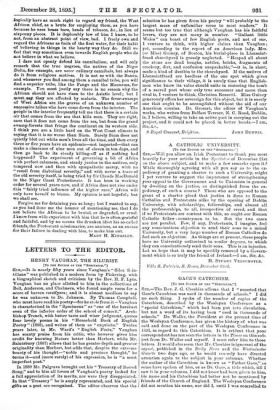LETTERS TO THE EDITOR,
HENRY VAUGHAN, THE SILURIST.
[TO THE EDITOR OF THE "SPECTATOR."] SIR,•-•It is nearly fifty years since Vaughan's " Silex tillans" was published in a modern form by Pickering, with a biographical sketch and criticism by the Rev. H. F. Lyte. Vaughan has no place allotted to him in the collections of Bell, Anderson, and Chalmers, who found ample room for a score of barren versifyers; and it is almost needless to say die was unknown to Dr. Johnson. By Thomas Campbell, who must have read his poetry—for he stole from it—Vaughan is characterised in the "Specimens" as "one of the harshest oven of the inferior order of the school of conceit." Arch- bishop Trench, with better taste and wiser judgment, quotes four lovely poems in his "Household Book of English Poetry" (1868), and writes of them as "exquisite." Twelve years later, in Mr. Ward's "English Poets," Vaughan has scanty praise from his critic, who however gives him credit for knowing Nature better than Herbert, while Mr. Saintsbury (1887) allows that he has greater depth and greater -originality than Herbert, but adds that, despite the extreme beauty of his thought—" noble and precious thought," he terms it—and (more rarely) of his expression, he is "a most imperfect poet."
In 1889 Mr. Palgrave brought out his "Treasury of Sacred Song," and to him all lovers of Vaughan's poetry looked for a full appreciation of its merits, nor were they disappointed. In that " Treasury " he is amply represented, and his special gifts as a poet are recognised. The editor observes that the selection he has given from his poetry "will probably be the largest mass of unfamiliar verse to most readers." It seems but too true that although Vaughan has his faithful lovers, they are not many in number. "Gallant little Wales" can boast of few English poets, and not of one, I venture to think, with higher claims than Vaughan ; yet, according to the report of an American lady, Mrs. (or Miss) Guiney, of Boston, his burial-place in Llansaint- fraed churchyard is grossly neglected. "Heaped all about the stone are dead boughs, nettles, bricks, fragments of crockery, dirt, and confusion unspeakable,"—it is, in short, made a kind of dustbin to the churchyard. If the natives of Llansaintfraed are heedless of the one spot which gives significance to their village, it is surely time that English- men who know its value should unite in restoring the tomb of a sacred poet whose only true successor and more than rival is, I venture to think, Christina Rossetti. Miss Guiney generously offers her sovereign for this object, but it is surely one that ought to be accomplished without the aid of our American cousins. Dr. Grosart, the editor of Vaughan's works, who writes from Belfast Terrace, N. C. Road, Dublin, is, I believe, willing to take an active part in carrying out the project, and it could not be placed in better hands.—I am, Sir, &c.,


































 Previous page
Previous page